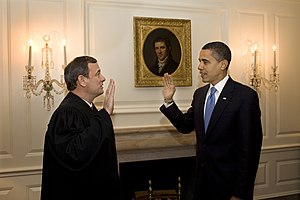| English: To avoid any constitutional problems, Chief Justice John G. Roberts Jr. administers the oath of office a second time with Barack Obama in the Map Room of the White House on Wednesday, January 21, 2009. (Photo credit: Wikipedia) |
Sen. John Thune (R., S.D.) said the address was a nod to Mr. Obama’s liberal supporters but ignored “the people on the Hill he needs to work with to get things done.”
The president never mentioned Republicans specifically, but his criticisms were clear. He laced his speech with themes from his presidential campaign, including a reference to the country’s prosperity resting “upon the broad shoulders of a rising middle class.”
In Their Words
Compare how often presidents used selected words in their inaugural addresses.
He also vigorously defended social safety-net programs, including Medicare, Medicaid and Social Security. GOP leaders have proposed cutting the programs in recent budget negotiations, and some Democrats have worried that Mr. Obama would agree, given that he has said he is open to such changes as part of a broad deficit-reduction deal that includes tax increases.
“These things do not sap our initiative,” Mr. Obama said of the three programs. “They strengthen us. They do not make us a nation of takers; they free us to take the risks that make this country great.”
Mr. Obama had taken the official oath of office Sunday in a quiet ceremony with family at the White House, in accord with the Jan. 20 date set in the Constitution for the start of presidential terms. That date fell on a Sunday this year, so Mr. Obama’s public inauguration was moved to Monday, a day that coincided with the Martin Luther King Jr. holiday.
With his hand on Bibles used by Dr. King and President Abraham Lincoln, Mr. Obama was sworn in by Chief Justice John Roberts about 11:50 a.m. on the Capitol steps. His wife, Michelle Obama, and their two daughters stood at his side, as congressional leaders, cabinet secretaries and former Presidents Bill Clinton and Jimmy Carter sat nearby.
Vice President Joe Biden, who was officially sworn in Sunday by Justice Sonia Sotomayor, also took a ceremonial oath Monday.
The Presidential Inaugural Committee said one million people attended the ceremony, but declined to say how it arrived at that number. Law-enforcement officials didn’t release crowd estimates, but the region’s subway authority said 538,000 people had entered the system as of 5 p.m., about 61% of the number for the 2009 inauguration. Many used other forms of transportation to reach the events. Officials had said they expected 500,000 to 700,000 to attend, compared with 1.8 million who came for Mr. Obama’s first inaugural ceremony.
Mr. Obama’s speech came at a time of continued economic struggle—at 7.8%, the U.S. unemployment rate is the same as in January 2009, after peaking at 10% during the president’s first term. Surveys show Americans feel less hopeful about the future under his leadership than when he first entered the White House.
Mr. Obama, who took office facing two wars, made scant mention of foreign policy, a contrast from his first inaugural address, which was largely a repudiation of former-President George W. Bush’s handling of foreign affairs.
Instead, Mr. Obama on Monday promoted a list of domestic goals favored by liberals, including equal pay for women, expanded voting rights and a shift to sustainable energy sources. He also became the first president to explicitly promote gay rights during an inaugural address.
Senate Minority Leader Mitch McConnell, a Kentucky Republican who has been a sharp White House critic, congratulated Mr. Obama but made clear the two parties have different agendas.
“The president’s second term represents a fresh start when it comes to dealing with the great challenges of our day; particularly, the transcendent challenge of unsustainable federal spending and debt,” Mr. McConnell said in a statement. “Republicans are eager to work with the president on achieving this common goal, and we firmly believe that divided government provides the perfect opportunity to do so.”
Agence France-Presse/Getty Images
Singers James Taylor, Kelly Clarkson and Beyoncé performed during the ceremony, but, overall, Mr. Obama’s second inauguration was lower key than his first.
Singers James Taylor, Kelly Clarkson and Beyoncé performed during the ceremony, but, overall, Mr. Obama’s second inauguration was lower key than his first.
After his speech, Mr. Obama took the first action of his second term, signing papers to nominate his choices to head of the State Department, Pentagon, Treasury and Central Intelligence Agency.
Mr. Obama began Inauguration Day with his family at St. John’s Episcopal Church across from the White House. He then hosted congressional leaders for coffee before traveling to the Capitol.
Later, Mr. Obama joined members of Congress and other dignitaries for a lunch before participating participated in the traditional inaugural parade from the Capitol to the White House. Mr. Obama and the first lady stepped out of the presidential limousine to walk along a stretch of Pennsylvania Avenue, drawing cheers from the crowd. Supporters chanted “Obama” and “Four more years!”
—Colleen McCain Nelson, Janet Hook, Siobhan Hughes and Laura Meckler contributed to this article.
Write to Laura Meckler at laura.meckler@wsj.com


No comments:
Post a Comment